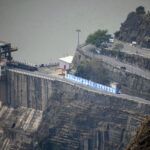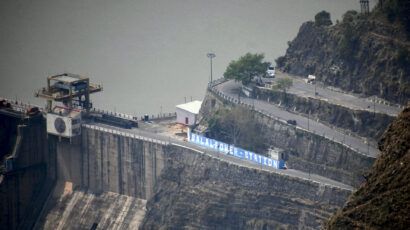Scientists and an atomic subcontinent
By Pervez Hoodbhoy | February 12, 2013
In India and Pakistan, leaders have rarely weighed the consequences of their actions. Instead, they have simply reacted to events and circumstances.
In India and Pakistan, leaders have rarely weighed the consequences of their actions. Instead, they have simply reacted to events and circumstances.
India started the nuclear race, so let me start with India, from circa 1974. After it chose to test a supposedly "peaceful nuclear device," there was little care or concern about how Pakistan would respond. The Indian leadership under Indira Gandhi was naive in its nuclear thinking. It could not imagine that Pakistan too could develop nuclear bombs and, ostrich-like, chose to remain ill-informed of Pakistan's capabilities or ponder upon the different options it had at that time. With eyes fixed towards China, perhaps it did not even care. Having dismissed Pakistani technical capability as inconsequential, the thought that India's military advantage could be eventually nullified by a nuclear Pakistan probably never crossed the minds of those Indians who mattered at the time. As it turned out, Indira Gandhi's successors proved as unenlightened as she had been.
A personal experience: Two months before the May 1998 nuclear tests conducted by India and Pakistan, a delegation from the Pugwash Movement met in Delhi with Prime Minister Inderjit Kumar Gujral. I was one of the delegates. As we sat around a table in the prime minister's house, I expressed my worry about a possible nuclear catastrophe befalling the subcontinent. To my surprise, Gujral twice assured me — first in public and later in private — that there was no cause for concern. As we prepared to depart, he came by and, upon learning that I was from Karachi, grew nostalgic about the city he had grown up in. Putting his arm around me he confidently and earnestly told me, speaking in Hindi-Urdu, that Pakistan lacked the competence to make atomic bombs. For quite a while, I felt very confused … could he be right?
The prime minister was scarcely alone in being mistaken. Senior Indian defense analysts like P.R. Chari had also published articles before May 1998 arguing this point, as had the former head of the Indian Atomic Energy Commission, Raja Ramanna. The Indian intelligence agency known as the Research and Analysis Wing (RAW), which Pakistanis generally believe to be ubiquitous and infinitely cunning, was also confused and gave contradictory reports. In fact the confusion went all the way up to the top. This became apparent at the time when India was in a state of euphoria in the days after the Pokharan tests. Mass celebrations were still in progress when, brimming with hubris, Home Minister L.K. Advani advised Pakistan to give up its claim on Kashmir because the "geostrategic" context had decisively changed in India's favour. At a time when Pakistan was supposed to be just a "screwdriver turn away from having a bomb," Indian newspapers taunted Pakistanis: Had the Chinese forgotten to send the screwdriver over with the bomb? Or were the instructions written in Chinese? Most Indians firmly believed that Pakistan did not possess the bomb.
But the Indians could not have been more wrong. Pakistan's bomb-makers had long been craving for an opportunity to show their own prowess. Six months after the tests, one of their leaders gave a public speech expressing his delight at the Indian test:
We had spent our lifetime on the project, and still there was no chance of a hot test. And on the morning of the 11th of May this year, one of our friends in the armed services phoned me and he said, "Have you heard the news today?" I said. "What?" He said, "The Indians have conducted the explosion in Pokhran." So I said, "Congratulations." I was genuinely happy. He said, "You are congratulating us on the Indian tests?" I said, "Yes, because now we would get a chance to do our own tests."
The confidence was well-placed. And hence, only 17 days later, with a thunderous roar, the mountains of Chagai shook and then turned white as five nuclear devices were simultaneously detonated inside a deeply drilled tunnel prepared years earlier. Two days later, for good measure, one more device was set off under the Ras-Koh hills. India's good cheer was suddenly shattered. Instead, recriminations and excuses started flying.
Mistaken notions extended into the Indian military as well. India's late "nuclear visionary" and army chief, Gen. K. Sunderji, had preached for years from a thick tome that came to be known as the "Sunderji Bible." His principal claim was that nuclear weapons would bring stability to the subcontinent, and that there would be no Cold War-type nuclear racing. Certainly he had Pakistan on his mind — not China — when, in the 1980s, he pressed hard for weaponizing India's nuclear capacity. With infectious enthusiasm, Sunderji lectured that India needed only a handful of fission weapons to "take out" major Pakistani cities. More was not better, he said. Like the other military men of his time, this rather simple and likeable man thought that these terrible weapons had now made war impossible.
My single encounter with Sunderji was at a conference in Washington in 1993. He had just finished speaking on the absolute security that nuclear weapons would bestow upon the world. I had never before or since met a man who loved the bomb more; his eyes would light up upon its mere mention. So, when I introduced myself to him as a Pakistani nuclear physicist, he was overjoyed and hugged me warmly saying: "I was commanding officer at Pokhran in 1974 when the damn thing went off. Right away I told the bug*** that we should give it to them [the Pakistanis] because war will then become impossible." I did not have the heart to tell him that Pakistan, inspired by India, was indeed well on its way to having more than a few of its own. Or, for that matter, that Sunderji's dangerous military exercises, Operation Brasstacks, had nearly brought the two countries to blows in 1987. For all his heartiness and bonhomie, this man's irresponsible and dangerous antics could have led to the deaths of thousands.
Sunderji's infectious nuclear enthusiasm had already made its way across the border. In March 1990, long before the nuclear tests had been carried out, Pakistan's Gen. K.M. Arif wrote in The Globe: "Let India and Pakistan both become nuclear weapon states openly and without reservations. They are both mature nations which need no counseling on their international responsibilities and conduct."
Top Pakistani generals, whose mannerisms scarcely differ from that of Indians, are fairly nonchalant about nuclear weapons. They seem to view these bombs as just another kind of bomb, albeit an oversized one. They had no appreciation of what would happen to the country after a nuclear war, apart from a rather dim understanding that many people would die.
I have many tales to tell.
In late 1989, a group of seven senior military officers, then studying operational matters at the National Defense College, came to meet me at the physics department of Quaid-e-Azam University. Their term project was to write a paper on nuclear strategy and posture in the Pak–India context. Although Pakistan did not officially acknowledge possessing such weapons then, the process of inducting them into the forces had already begun. It was also a time when there was almost zero understanding of nuclear matters in the military, and, quite sensibly, they were keen to learn technical details from every available source.
Since this group was larger than could fit into my little office, I led them to the physics department conference room (still called the "tea room" by everybody because that's where we have our 10:30 a.m. tea every day). We spent the next two hours there, discussing everything from blast radii and firestorms to electronic locks and PALS (permissive action links). The officers took copious notes and appeared satisfied. As they prepared to leave, I asked what circumstances, in their opinion, would warrant the use of nuclear weapons by Pakistan. After some reflection one officer spoke up. "Professor," he assured me, "they shall be used only defensively if at all, and only if the Pakistan Army faces defeat. We cannot allow ourselves to be dishonored." Around the table, heads nodded in agreement. Significantly, the calculus of destruction — that cities and populations would be obliterated on both sides — was not what mattered. Instead it was ghairat — the protection of honor — that was primary. Preserving a tribal value, probably acquired around Neolithic times, was considered more important than preserving life.
In the same year that I encountered Sunderji, I also met with Gen. Shamim Alam Khan. He was then chairman of the Joint Chiefs of Staff. Frankly, it's a little scary to receive a call from military headquarters in Rawalpindi. Our generals usually don't deign to talk to professors, especially dissident ones. But here was a staff car, with a smart uniformed officer, that had been dispatched to fetch me from the university. I had to wait for an hour outside Gen. Alam's office; A.Q. Khan, who walked past me (he did not know me at the time), had suddenly dropped in to meet him.
Once Khan left, the general had many questions for me. He told me that the army was just learning to operationally integrate its newly acquired weapons into the command structure, and so wanted to know all about permissive action links; command and control issues; possibilities of accidental nuclear war, etc. Although he was certainly aware of my opposition to the bomb, he was still sufficiently curious.
Alam was a tough, short man who passionately hated India. He regaled me with various episodes. Once he had excused himself in 1985 from an order received from the president, Gen. Muhammad Zia-ul-Haq. Zia was about to embark for Delhi on his famous cricket diplomacy stint and had ordered Alam to accompany him there. Alam asked to be excused saying: "Sir, if I ever enter Delhi it shall be only if I am sitting behind the turret of my tank." He then told me how, borrowing a small, propeller-driven army reconnaissance plane from his army aviation unit, he had piloted it into Indian territory and flown around for a full half an hour before returning to base. The Indians duly protested; Pakistan duly denied. His purpose for this stint was to spite Zia for his peace initiative.
After Alam had quizzed me on technical matters for over two hours, toward the end I said something to the effect that nuclear war should never even be contemplated because it would wipe out Pakistan. Alam was visibly irritated: "Professor, what you are claiming is nonsense." He then asked me to alculate roughly how many would die if 100 Indian bombs were dropped on Pakistan. My rough estimation satisfied him: Pakistan would lose 13 percent of its population of 130 million (as it was then; it is 200 million now). Alam was triumphant — this was a tolerable injury, and hence not sufficient reason to hold back from a nuclear war. In time, Pakistan would recover!
Alam's thinking was not very different from that of the late K.S. Subrahmanyam, India's most influential Indian defense analyst in the 1980s and 1990s. In one of his articles, Subrahmanyam wrote:
Even the failure of deterrence will cause vast, but still finite damage, considering the kind of arsenal the two sides are likely to have for a long time to come, with the advantage being in favour of India if India were to exercise its option (to arm with nuclear weapons). It will not mean nuclear winter, rapid escalation involving the use of hundreds of warheads and loss of control over the war. It will be analogous to the situation between the superpowers in the early ‘50s. That situation will still be preferable to one of India remaining nonnuclear, facing the threat of humiliation, defeat and disintegration.
The perspective offered in our book is frankly different from what Indian and Pakistani leaders (and too many academics writing on the subject) have held. The authors are scientists who believe in a moral universe, where human life is to be valued and its destruction en masse to be abhorred. Nevertheless, while taking a position against nuclear weapons, it is not our intent to needlessly moralize. Facts are stated exactly as they happen to be. This is a responsibility that we owe both to our profession as scientists, and to our own selves, as well, for the facts of the nuclear situation in Pakistan and India are, without exaggeration, frightening, in and beyond the subcontinent.
Together, we make the world safer.
The Bulletin elevates expert voices above the noise. But as an independent nonprofit organization, our operations depend on the support of readers like you. Help us continue to deliver quality journalism that holds leaders accountable. Your support of our work at any level is important. In return, we promise our coverage will be understandable, influential, vigilant, solution-oriented, and fair-minded. Together we can make a difference.
Topics: Nuclear Weapons, Opinion















